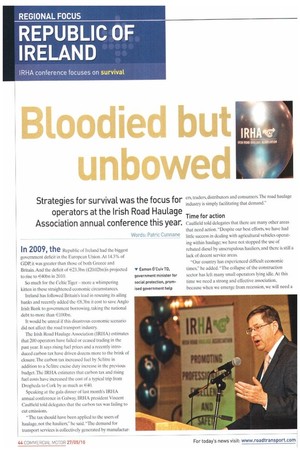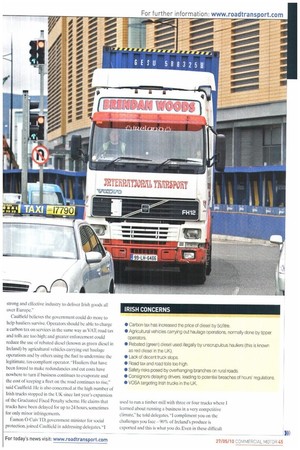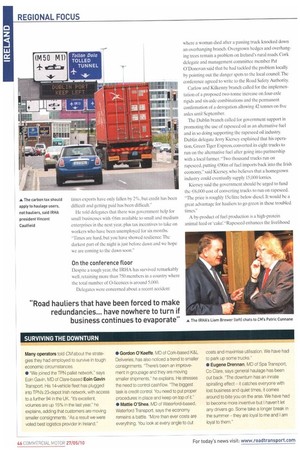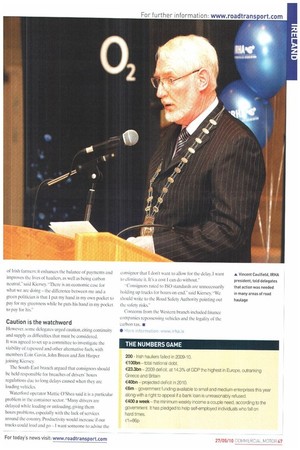La o I. rt Prinwe
Page 44

Page 45

Page 46

Page 47

If you've noticed an error in this article please click here to report it so we can fix it.
Strategies for survival was the focus for operators at the Irish Road Haulage Association annual. conference this year.
Words: Patric Cunnane
In 2009 the In 2009 the
Republic of Ireland had the biggest government deficit in the European Union. At 14.3% of GDP, it was greater than those of both Greece and Britain. And the deficit of E23.3bn (£20.02bn)is projected v Eamon o'Cuiv TO, to rise to €40bn in 2010. government minister for So much for the Celtic Tiger — more a whimpering social protection, prom kitten in these straightened economic circumstances. ised government help Ireland has followed Britain's lead in rescuing its ailing banks and recently added the €8.3bn it cost to save Anglo Irish Bank to government borrowing, taking the national debt to more than E100bn.
It would be unreal if this disastrous economic scenario did not affect the road transport industry.
The Irish Road Haulage Association (IRHA) estimates that 200 operators have failed or ceased trading in the past year. It says rising fuel prices and a recently introduced carbon tax have driven dozens more to the brink of closure. The carbon tax increased fuel by 5c/litre in addition to a 5e/litre excise duty increase in the previous budget. The IRHA estimates that carbon tax and rising fuel costs have increased the cost of a typical trip from Drogheda to Cork by as much as €40.
Speaking at the gala dinner of last month's IRHA annual conference in Galway, IRHA president Vincent Caulfield told delegates that the carbon tax was failing to cut emissions.
"The tax should have been applied to the users of haulage, not the hauliers," he said. "The demand for transport services is collectively generated by manufactur ers, traders, distributors and consumers. The road haulage industry is simply facilitating that demand."
Time for action Caulfield told delegates that there are many other areas that need action. "Despite our best efforts, we have had little success in dealing with agricultural vehicles operating within haulage; we have not stopped the use of rebated diesel by unscrupulous hauliers, and there is still a lack of decent service areas.
"Our country has experienced difficult economic times," he added. "The collapse of the construction sector has left many small operators lying idle. At this time we need a strong and effective association, because when we emerge from recession, we will need a strong and effective industry to deliver Irish goods all over Europe."
Caulfield believes the government could do more to help hauliers survive. Operators should be able to charge a carbon tax on services in the same way as VAT; road tax and tolls are too high: and greater enforcement could reduce the use of rebated diesel (known as green diesel in Ireland) by agricultural vehicles carrying out haulage operations and by others using the fuel to undermine the legitimate, tax-compliant operator. "Hauliers that have been forced to make redundancies and cut costs have nowhere to turn if business continues to evaporate and the cost of keeping a fleet on the road continues to rise," said Caulfield. He is also concerned at the high number of Irish trucks stopped in the UK since last year's expansion of the Graduated Fixed Penalty scheme. He claims that trucks have been delayed for up 10 24 hours, sometimes for only minor infringements.
Eamon 0 CAIN TD, government minister for social protection. joined Caulfield in addressing delegates. "I used to run a timber mill with three or four trucks where I learned about running a business in a very competitive climate," he told delegates. "I compliment you on the challenges you face — 90% of Ireland's produce is exported and this is what you do. Even in these difficult times exports have only fallen by 2%, but credit has been difficult and getting paid has been difficult."
He told delegates that there was government help for small businesses with E6m available to small and medium enterprises in the next year, plus tax incentives to take on workers who have been unemployed for six months. -Times are hard, but you have showed resilience. The darkest part of the night is just before dawn and we hope we are coming to the dawn soon."
On the conference floor
Despite a tough year, the 1RHA has survived remarkably well, retaining more than 750 members in a country where the total number of 0-licences is around 5,000.
Delegates were concerned about a recent accident where a woman died after a passing truck knocked down an overhanging branch. Overgrown hedges and overhanging trees remain a problem on Ireland's rural roads. Cork delegate and management committee member Pat O'Donovan said that he had tackled the problem locally by pointing out the danger spots to the local council. The conference agreed to write to the Road Safety Authority.
Carlow and Kilkenny branch called for the implementation of a proposed two-tonne increase on four-axle rigids and six-axle combinations and the permanent confirmation of a derogation allowing 42 tonnes on five axles until September.
The Dublin branch called for government support in promoting the use of rapeseed oil as an alternative fuel and in so doing supporting the rapeseed oil industry. Dublin delegate Jerry Kiersey explained that his operation, Green Tiger Express, converted its eight trucks to run on the alternative fuel after going into partnership with a local farmer. "Two thousand trucks run on rapeseed. putting €90m of fuel imports back into the Irish economy.said Kiersey, who believes that a homegrown industry could eventually supply 15,000 lorries.
Kiersey said the government should be urged to fund the €6,000 cost of converting trucks to run on rapeseed. "The price is roughly 15c/litre below diesel. It would be a great advantage for hauliers to go green in these troubled times."
A by-product of fuel production is a high-protein animal feed or 'cake: "Rapeseed enhances the livelihood of Irish farmers; it enhances the balance of payments and improves the lives of hauliers, as well as being carbon neutral," said Kiersey.''There is an economic case for what we are doing the difference between me and a green politician is that I put my hand in my own pocket to pay for my greenness while he puts his hand in my pocket to pay for his."
Caution is the watchword
However, some delegates urged caution, citing continuity and supply as difficulties that must be considered. It was agreed to set up a committee to investigate the viability of rapeseed and other alternative fuels, with members Eoin Gavin, John Breen and Jim Harper joining Kiersey.
The South-East branch argued that consignors should be held responsible for breaches of drivers' hours regulations due to long delays caused when they are loading vehicles.
Waterford operator Mattie O'Shea said it is a particular problem in the container sector. "Many drivers are delayed while loading or unloading, giving them hours problems, especially with the lack of services around the country. Productivity would increase if our trucks could load and go I want someone to advise the consignor that I don't want to allow for the delay, I want to eliminate it. It's a cost I can do without."
"Consignors rated to ISO standards are unnecessarily holding up trucks for hours on end." said Kiersey."We should write to the Road Safety Authority pointing out the safety risks."
Concerns from the Western branch included finance companies repossessing vehicles and the legality of the carbon tax. • • More information! viww.irtia.ie
































































































































